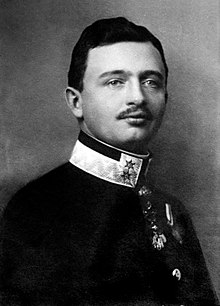Emperor Karl I
| Blessed Charles of Austria-Hungary | |
|---|---|
 |
|
| Emperor; Layman | |
| Venerated in | Roman Catholic Church |
| Beatified | 3 October 2004, Saint Peter's Square, Vatican City by Pope John Paul II |
| Feast | 21 October |
| Attributes |
|
|
Styles of Charles I of Austria |
|
|---|---|
 |
|
| Reference style | His Imperial and Royal Apostolic Majesty |
| Spoken style | Your Imperial and Royal Apostolic Majesty |
| Alternative style | Sir |
Charles I (Karl Franz Joseph Ludwig Hubert Georg Otto Maria; 17 August 1887 – 1 April 1922) was the last ruler of the Austro-Hungarian Empire. He was the last Emperor of Austria, the last King of Hungary (as Charles IV), and the last monarch belonging to the House of Habsburg-Lorraine. After his uncle Franz Ferdinand was assassinated in 1914, Charles became the designated successor of the Emperor Franz Josef. Charles I reigned from 1916 until 1918, when he "renounced participation" in state affairs, but did not abdicate. He spent the remaining years of his life attempting to restore the monarchy until his death in 1922. Following his beatification by the Catholic Church in 2004, within Catholic circles he is commonly known as Blessed Karl of Austria.
Charles was born 17 August 1887 in the Castle of Persenbeug in Lower Austria. His parents were Archduke Otto Franz of Austria and Princess Maria Josepha of Saxony. At the time, his granduncle Franz Joseph reigned as Emperor of Austria and King of Hungary, and his uncle Franz Ferdinand became heir presumptive two years later.
As a child, Archduke Charles was reared a devout Roman Catholic. He spent his early years wherever his father's regiment happened to be stationed; later on he lived in Vienna and Reichenau an der Rax. He was privately educated, but, contrary to the custom ruling in the imperial family, he attended a public gymnasium for the sake of demonstrations in scientific subjects. On the conclusion of his studies at the gymnasium, he entered the army, spending the years from 1906 to 1908 as an officer chiefly in Prague, where he studied law and political science concurrently with his military duties.
...
Wikipedia

